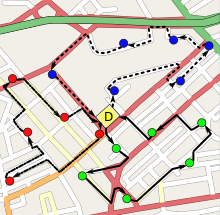Applied mathematics
Appearance

Applied mathematics is a branch of mathematics that deals with mathematical methods that find use in science, engineering, business, computer science, and industry.
| This mathematics-related article is a stub. You can help out with Wikiquote by expanding it! |
Quotes
[edit]- I maintain that in every special natural doctrine only so much science proper is to be met with as mathematics; for... science proper, especially of nature, requires a pure portion, lying at the foundation of the empirical, and based upon à priori knowledge of natural things. ...the conception should be constructed. But the cognition of the reason through construction of conceptions is mathematical. A pure philosophy of nature in general, namely, one that only investigates what constitutes a nature in general, may thus be possible without mathematics; but a pure doctrine of nature respecting determinate natural things (corporeal doctrine and mental doctrine), is only possible by means of mathematics; and as in every natural doctrine only so much science proper is to be met with therein as there is cognition à priori, a doctrine of nature can only contain so much science proper as there is in it of applied mathematics.
- Immanuel Kant, Preface, The Metaphysical Foundations of Natural Science (1786) Tr. Ernest Belfort Bax (1883)
- My decision to leave applied mathematics for economics was in part tied to the widely-held popular belief in the 1960s that macroeconomics had made fundamental inroads into controlling business cycles and stopping dysfunctional unemployment and inflation.
- Robert C. Merton, Robert C. Merton - Biographical at Nobelprize.org, 1995
- Pure mathematics consists entirely of assertions to the effect that, if such and such a proposition is true of anything, then such and such another proposition is true of that thing. It is essential not to discuss whether the first proposition is really true, and not to mention what the anything is, of which it is supposed to be true. Both these points would belong to applied mathematics. We start, in pure mathematics, from certain rules of inference, by which we can infer that if one proposition is true, then so is some other proposition. These rules of inference constitute the major part of the principles of formal logic. We then take any hypothesis that seems amusing, and deduce its consequences. If our hypothesis is about anything, and not about some one or more particular things, then our deductions constitute mathematics. Thus mathematics may be defined as the subject in which we never know what we are talking about, nor whether what we are saying is true. People who have been puzzled by the beginnings of mathematics will, I hope, find comfort in this definition, and will probably agree that it is accurate.
- Bertrand Russell, Recent Work on the Principles of Mathematics, published in International Monthly, Vol. 4 (1901),
- From Pythagoras to Boethius, when pure mathematics consisted of arithmetic and geometry while applied mathematics consisted of music and astronomy, mathematics could be characterized as the deductive study of 'such abstractions as quantities and their consequences, namely figures and so forth' (Acquinas ca. 1260). But since the emergence of abstract algebra it has become increasingly difficult to formulate a definition to cover the whole of the rich, complex and expanding domain of mathematics.
- George Frederick James Temple, 100 Years of Mathematics: a Personal Viewpoint (1981)
- Pure mathematics is much more than an armoury of tools and techniques for the applied mathematician. On the other hand, the pure mathematician has ever been grateful to applied mathematics for stimulus and inspiration. From the vibrations of the violin string they have drawn enchanting harmonies of Fourier Series, and to study the triode valve they have invented a whole theory of non-linear oscillations.
- George Frederick James Temple, 100 Years of Mathematics: a Personal Viewpoint (1981)
See also
[edit]External links
[edit]

